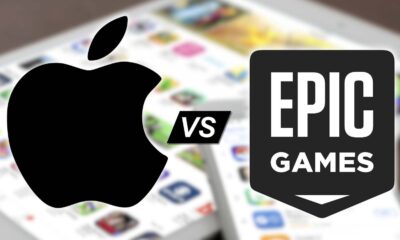Just a heads up, if you buy something through our links, we may get a small share of the sale. It’s one of the ways we keep the lights on here. Click here for more.
Apple Arcade is a brand new marketplace/platform tailored to Apple hardware users and it’s coming very, very soon.
It’s the “Netflix for games” venture capitalists everywhere have been clamoring for, where you subscribe for $4.99 a month and get unlimited access to all titles – all free of ads and in-app purchases. It sounds like a dream come true for consumers, but I have some concerns. I checked out an early access preview and here’s what I thought.
First off, the early access preview was just six games, including Sneaky Sasquatch, Hot Lava, and a few more
All of them were mechanically simple, from an autorunning platformer to a point-and-click adventure, to a first-person parkour title. I also noticed that they all looked like artistic relatives, featuring chunk 3D models and vibrant, high saturation colors that are in vogue right now.
I think the latter is because of a technical requirement: All games in Apple Arcade are playable on Mac OS X, tvOS, and iOS (phones and tablets alike). That’s a great consumer feature, but a massive developmental burden. In order to release an Apple Arcade game, you have to develop for four different form factors and who knows how many resolutions and hardware profiles. Big oof.
All of that leads to a design issue that I can’t quite wrap my head around
Every game has to have a relatively universal control scheme. That doesn’t sound like much, but just think of the difference between a controller-based game and a touch-screen-based game and you’ll start to see the problem. Games that feel creative and playful with touch interaction will feel totally different with a mouse cursor or with an analog stick.
There are definitely some that will work no matter what, like turn-based strategy, but it’s hard to imagine anything flourishing well when it has to support every way it can be played.
This would make sense if there was a lucrative deal for developers, but I’m not convinced that’s going to happen and it leads into an even bigger concern that I have
Apple is reportedly helping with anyone who agrees to an exclusivity contract, but outside of that developers are paid based on the time players spend playing their games.
I don’t know the numbers, but here’s a hypothetical situation:
- Steam is the largest digital game distributor in the world.
- Steam has an estimated 90 million active users globally, according to an April 2019 article in Variety.
- MacWorld estimated in 2010 that 11% of Steam purchases were for Mac. Based on conversations I’ve had with developers, that is approximately accurate (and potentially a little high).
- Let’s round things out and say there are 10M Mac gamers and all of them are excited about Apple Arcade and subscribe immediately.
- That puts monthly Apple Arcade revenue at $50M and that’s the ceiling.
- Apple’s revenue split has been 70/30 developer/platform and I assume that won’t change for Apple Arcade. That means devs are splitting $35M/month
- Typically, games are only relevant for maybe a few months. There’s lots of data to support virtually no long-tail revenue, which is where seasonal content, DLC, and sales come from: Each of those spikes revenue briefly and long-term sustainability can happen by following those models.
- Apple Arcade is launching with 100 games. For the sake of argument, let’s assume they’re all equally popular and get played an equal amount of time. If this is true, each developer would make $350,000 a month for their work.
- If a game is relevant for three months before it becomes unplayed – a long estimate, let’s be clear – then a developer would make $1M lifetime for their game.
- Job Monkey reports an average game industry salary of $84,000, which means you get about 12 human years of work to be completely revenue-neutral for a title. That’s 2 years for a team of 6, 6 months for a team of 24, etc.
- All of this also assumes maximum benefit on the developer side of things. If Apple Arcade is only 10% as popular, that means you only get 1.2 years of dev time, which is astronomically small for a title that needs to release on three platforms and at least half a dozen basic hardware profiles.
- If your game is unpopular, you could literally make nothing. Note that games aren’t allowed to have in-app purchases or ads, so you can’t even supplement a large install base with other revenue models. You only get money based on time spent playing.
I think in light of the above math and potential outcomes, Apple Arcade is a raw deal
There are 100 games to start on the platform, so your percentage of time played as a developer is just going to get worse and worse as the marketplace gets more and more flooded. Similarly, short, creative titles are going to be massively disincentivized from ever being released on the platform.
Got an 8-hour brilliant visual novel like the recently-released Eliza? Tough, you’re going to make less money than a JRPG that gets players to grind for 200 hours or a roguelike you’re supposed to replay a thousand times.
I think as players we have to ask ourselves: Is that what we want from developers?

Image: 9to5Mac
Personally: Absolutely not. I want games that demand less of my time, not more. Give me the best, most concise experience possible and let me move on to other things, please. I love a good roguelike, but oh my god I don’t want that to be the best, only genre that gets developed.
That said, I get it. I understand that new models have to start existing for developers. The industry standard 70/30 split found on Steam, Mac App Store, PSN, XBL, Nintendo eShop, and more has to die. The Epic Game Store is a step in the right direction, with a much more developer-friendly 88/12 split – a huge reason many developers are switching to that marketplace – and we need even more options that are going to treat the people who make games better.
Then again, everyone could also switch to indie site itch.io, a marketplace that lets developers set whatever revenue split they think is fair and allows players to download DRM-free copies of the games they buy. If you want to support developers, itch.io remains the #1 way to give them money most efficiently.
Just, whatever happens, please check me out of this race to the bottom.
What do you think? Are you interested in Apple Arcade or will you be passing on the subscription? Let us know down below in the comments or carry the discussion over to our Twitter or Facebook.
Editors’ Recommendations:
- Misgendering the non-binary robot FL4K in Borderlands 3 might get you banned and here’s why
- Rocket League in No Man’s Sky is the most ambitious crossover of 2019
- Holy shit, Mortal Kombat 11 is adding the Terminator and Joker as playable characters
- Surprise, the Hotline Miami Collection is available RIGHT NOW on Nintendo Switch



























